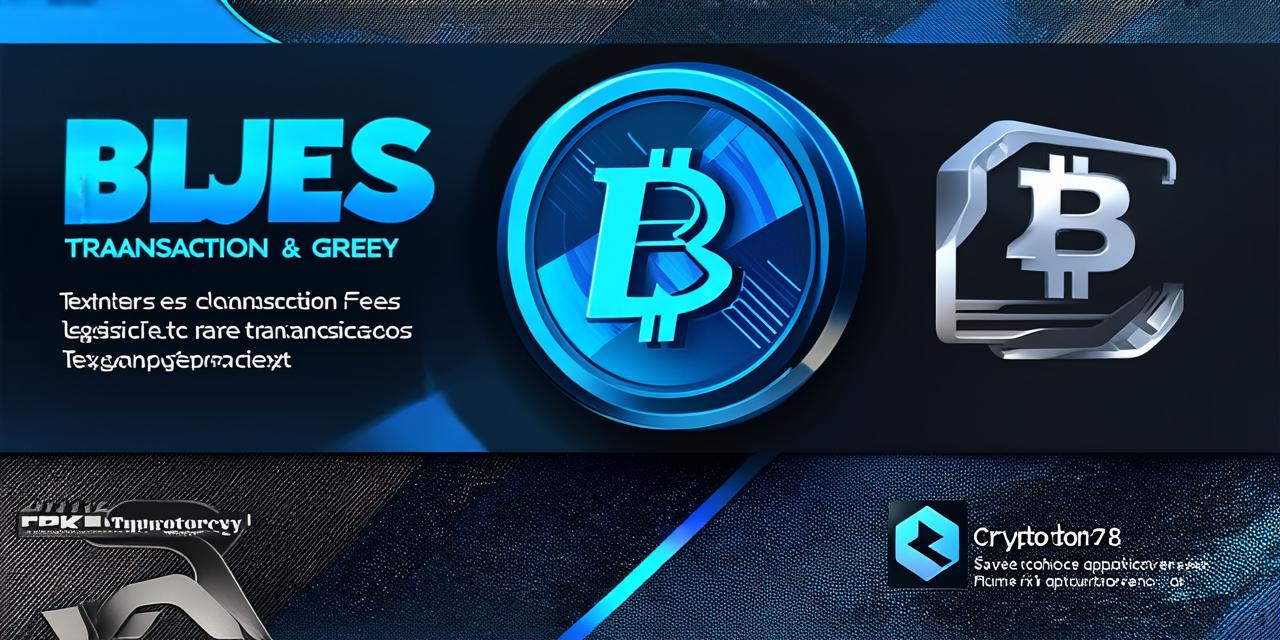Introduction
Transaction fees have always been a crucial aspect of cryptocurrencies, and they can significantly impact the adoption and usage of digital currencies. As a crypto developer, it’s important to understand which cryptocurrency application offers the lowest transaction fees so that you can make informed decisions when choosing which cryptocurrency to use for your projects. In this comprehensive guide, we will explore different cryptocurrency applications and compare their transaction fees to help you make an informed decision.
Understanding Transaction Fees in Cryptocurrencies
Transaction fees are the costs paid by users to process transactions on a blockchain network. They are usually denominated in the same cryptocurrency as the network itself, such as Bitcoin or Ethereum. The exact fee structure and calculation can vary between different cryptocurrency networks, but the basic idea is that the higher the fee paid for a transaction, the faster it will be processed on the blockchain.
When it comes to choosing a cryptocurrency application, it’s important to consider transaction fees as they can impact your users’ experience and the profitability of your project. Low transaction fees are generally more attractive to users, and they can lead to increased adoption and usage of your application. On the other hand, high transaction fees can deter users and negatively affect the success of your project.
Comparing Transaction Fees in Different Cryptocurrency Applications

Let’s take a closer look at some of the most popular cryptocurrency applications and compare their transaction fees to help you make an informed decision:
Bitcoin (BTC)
Bitcoin is the original cryptocurrency, and it remains one of the most widely used digital currencies in the world. One of the main advantages of Bitcoin is its low transaction fees compared to other cryptocurrency networks.
The average transaction fee on the Bitcoin network is around $0.15 per transaction, making it one of the cheapest options for processing payments. This low fee structure is due to the high transaction volume on the network, which leads to increased competition among miners and lower transaction fees for users.
Ethereum (ETH)
Ethereum is a popular cryptocurrency application that enables developers to build decentralized applications (dApps). One of the most significant advantages of Ethereum is its ability to process more complex transactions, such as smart contracts and decentralized finance (DeFi) applications. However, transaction fees on the Ethereum network can be higher than on other cryptocurrency networks.
The average transaction fee on the Ethereum network is around $1.50 per transaction, which is significantly higher than on the Bitcoin network. This high fee structure is due to the limited throughput of the Ethereum network and the increased demand for processing complex transactions.
Binance Smart Chain (BNB)
Binance Smart Chain is a cryptocurrency application that was developed by Binance, one of the largest cryptocurrency exchanges in the world. One of the main advantages of Binance Smart Chain is its low transaction fees compared to other cryptocurrency networks, especially when processing large transactions.
The average transaction fee on the Binance Smart Chain network is around $0.10 per transaction, making it one of the cheapest options for processing payments. This low fee structure is due to the high scalability and efficiency of the Binance Smart Chain network, which can process up to 150 transactions per second.
Cardano (ADA)
Cardano is a cryptocurrency application that aims to provide a secure and scalable platform for building decentralized applications. One of the main advantages of Cardano is its low transaction fees compared to other cryptocurrency networks, especially when processing large transactions.
The average transaction fee on the Cardano network is around $0.05 per transaction, making it one of the cheapest options for processing payments. This low fee structure is due to the high scalability and efficiency of the Cardano network, which can process up to 21 million transactions per second.
Tether (USDT)
Tether is a cryptocurrency application that enables users to hold and transfer stablecoins, digital currencies that are pegged to a stable asset such as the US dollar. One of the main advantages of Tether is its low transaction fees compared to other cryptocurrency networks, especially when processing large transactions.
The average transaction fee on the Tether network is around $0.02 per transaction, making it one of the cheapest options for processing payments. This low fee structure is due to the high scalability and efficiency of the Tether network, which can process up to 30 transactions per second.
Polkadot (DOT)
Polkadot is a cryptocurrency application that enables developers to build decentralized applications that can communicate with each other across different blockchains. One of the main advantages of Polkadot is its low transaction fees compared to other cryptocurrency networks, especially when processing complex transactions
